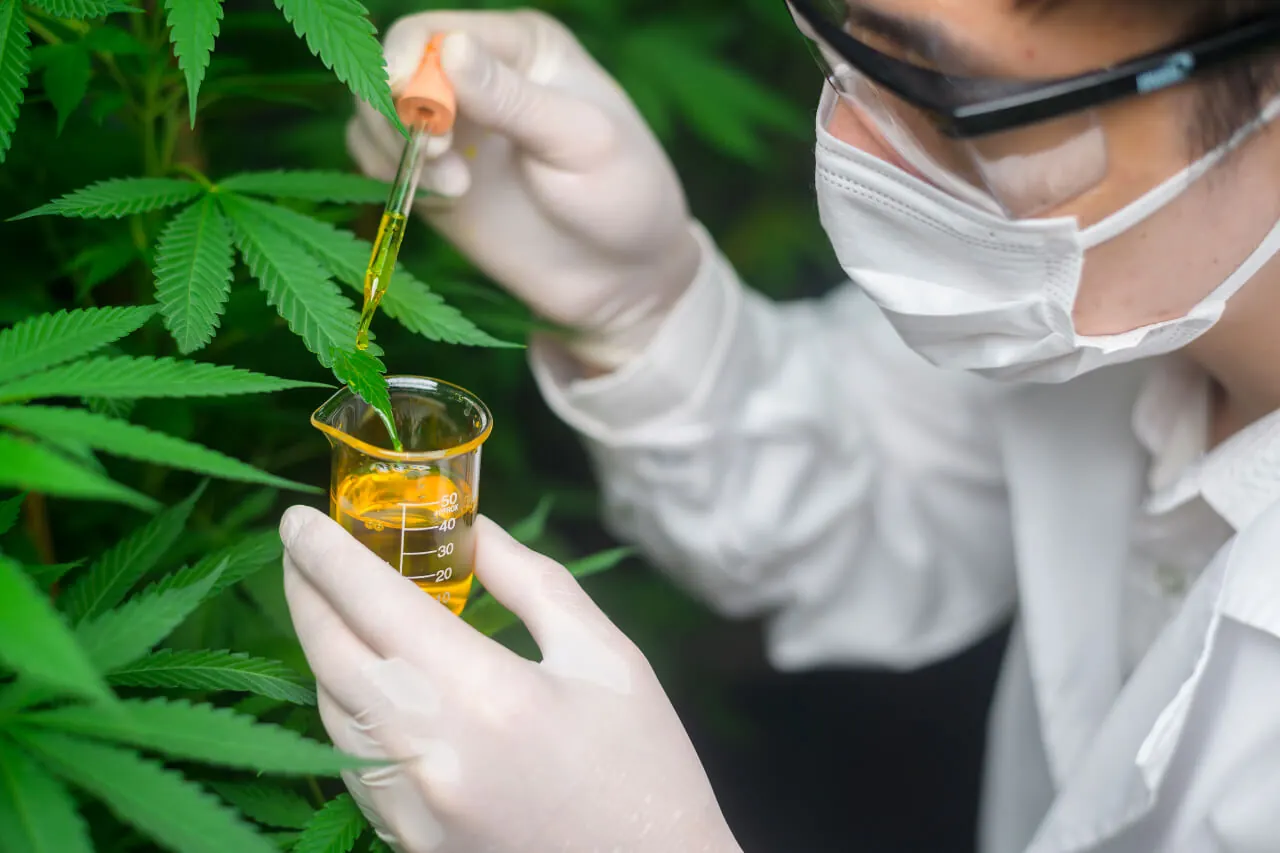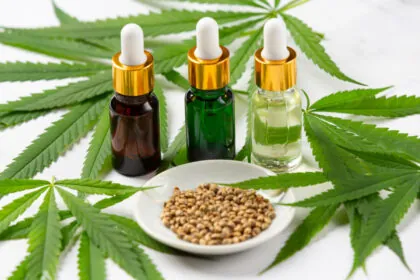CBD, or cannabidiol, is a natural compound that has gained popularity in recent years for its potential health benefits.
CBD is derived from the cannabis plant, but unlike THC, the psychoactive component of marijuana, CBD does not cause a high or impair cognition.
Instead, cannabidiol interacts with the endocannabinoid system, a network of receptors and molecules that regulate various functions in the body, such as pain, inflammation, mood, sleep, appetite, and more.
Many people use cannabidiol products, such as oils, capsules, gummies, creams, or vapes, to treat various conditions, such as chronic pain, arthritis, anxiety, depression, epilepsy, insomnia, and more.
CBD has shown promising results in some clinical trials and anecdotal reports, but more research is needed to confirm its safety and efficacy for different medical uses.
However, cannabidiol is not a miracle cure that can be used without any precautions.
Cannabidiol can interact with many other drugs, especially those that are metabolized by the liver enzymes.
This can lead to serious side effects or reduced effectiveness of the medications.
Therefore, it is important to be aware of the potential risks of combining cannabidiol with other drugs and consult your doctor before using Cannabidiol or any other medication.
In this blog post, we will provide you with the ultimate list of drugs that should not be taken with cannabidiol, based on the current scientific evidence and expert recommendations.
We will also explain the mechanisms of how cannabidiol can affect other drugs, and what you can do to avoid or minimize the interactions.
How CBD Can Affect Your Prescription Drugs?
- Cytochrome P450 Enzymes:
- Cannabidiol interacts with the liver’s cytochrome P450 enzymes responsible for metabolizing many pharmaceutical drugs.
- It can inhibit or induce these enzymes, affecting the rate at which certain medications are broken down.
- Inhibition of Enzymes:
- Inhibition may lead to higher concentrations of drugs in the bloodstream, intensifying their effects and potential side effects.
- Commonly affected medications include anticoagulants, anti-seizure drugs, and some antidepressants.
- Potential Drug Interactions:
- Cannabidiol may interact with drugs metabolized by the P450 system, impacting their efficacy.
- It’s crucial to be aware of potential interactions with medications like blood thinners, anti-epileptics, and certain antipsychotics.
- CBD’s Influence on Specific Medications:
- Blood Thinners: Cannabidiol might increase the risk of bleeding when taken with anticoagulant medications.
- Anti-Seizure Drugs: CBD’s interaction may alter blood levels of anti-seizure medications.
- Antidepressants: Cannabidiol can impact the metabolism of certain antidepressants.
- Individual Variations:
- Responses to CBD-drug interactions can vary based on individual factors, including genetics, dosage, and the specific medications involved.
- Consulting Healthcare Professionals:
- Always consult healthcare professionals before combining CBD with prescription drugs.
- Regular monitoring and adjustments to medication dosages may be necessary under professional guidance.
- Timing and Dosage:
- Consider spacing the intake of CBD and prescription medications to minimize potential interactions.
- Starting with low CBD doses allows for careful observation of individual responses.
- Full Medication List:
- Provide healthcare providers with a comprehensive list of all medications, including supplements and cannabidiol products.
- Monitoring for Side Effects:
- Pay attention to any unusual side effects or changes in the effectiveness of prescription drugs when introducing cannabidiol.
- Research and Updated Information:
- Stay informed about the latest research and information on CBD-drug interactions, as knowledge in this area continues to evolve.
Remember, individual responses vary, and professional medical advice is essential to ensure safe and effective integration of CBD with prescription drugs.
Always consult with healthcare providers for personalized guidance based on your specific health profile.
Drugs You Should not be Taken with CBD
it’s important to note that drug interactions can vary among individuals, and consulting with a healthcare professional is crucial before combining CBD with any medication.
Here are 9 drugs where potential interactions with CBD have been identified:
- Anticoagulants (Blood Thinners):
- CBD may increase the risk of bleeding when taken with anticoagulant medications like warfarin or heparin.
- Combining CBD with blood thinners may require close monitoring, and adjustments to medication dosage may be necessary.
- Antiplatelet Drugs:
- Similar to anticoagulants, Cannabidiol may enhance the effects of antiplatelet drugs like clopidogrel, increasing the risk of bleeding.
- Anticonvulsants (Anti-Seizure Medications):
- CBD’s interaction with liver enzymes may affect blood levels of anticonvulsant medications, potentially altering their efficacy.
- Monitoring and adjustments to anticonvulsant dosages may be needed.
- Antidepressants (Selective Serotonin Reuptake Inhibitors – SSRIs):
- CBD may impact the metabolism of SSRIs like fluoxetine and sertraline.
- Combining CBD with antidepressants may require careful monitoring and potential dosage adjustments.
- Antipsychotics:
- CBD may affect the metabolism of antipsychotic medications, such as haloperidol or quetiapine.
- Monitoring for changes in the therapeutic effects and potential side effects is advised.
- Benzodiazepines:
- Cannabidiol may enhance the sedative effects of benzodiazepines like diazepam or lorazepam.
- Combining Cannabidiol with benzodiazepines may require adjustments to benzodiazepine dosages.
- Immunosuppressants:
- CBD’s influence on liver enzymes may impact the blood levels of immunosuppressant medications like tacrolimus or cyclosporine.
- Regular monitoring and potential dosage adjustments are recommended.
- Statins (HMG-CoA Reductase Inhibitors):
- CBD may interact with statin medications like atorvastatin or simvastatin, potentially impacting their metabolism.
- Monitoring cholesterol levels and potential adjustments to statin dosages may be needed.
The Do’s and Don’ts of Combining CBD with Other Medications
Do’s:
- Consult with Your Healthcare Provider:
- Do seek advice from your healthcare provider before combining Cannabidiol with any medications. They can provide personalized guidance based on your health condition.
- Start with Low Doses:
- Do start with a low dose of CBD and gradually increase if needed. This allows you to observe how your body reacts and minimizes the risk of adverse effects.
- Monitor for Changes:
- Do monitor for any changes in your symptoms or side effects when introducing CBD. Regular observation helps identify potential interactions.
- Choose High-Quality CBD Products:
- Do opt for high-quality CBD products from reputable sources. Ensure the product is tested for purity and potency to minimize risks.
- Maintain Open Communication:
- Do communicate openly with your healthcare provider about your CBD use. Share any concerns or changes in your health to facilitate informed decision-making.
Don’ts:
- Don’t Self-Medicate:
- Don’t use Cannabidiol to replace prescribed medications without consulting your healthcare provider. It’s not a substitute for professional medical advice.
- Avoid High Doses Initially:
- Don’t start with high doses of Cannabidiol , especially if you are concurrently taking medications. High doses may increase the risk of adverse effects or interactions.
- Don’t Overlook Individual Variations:
- Don’t assume that Cannabidiol interactions are the same for everyone. Individual responses vary, and what works for one person may not be suitable for another.
- Avoid Assuming CBD Is Risk-Free:
- Don’t assume that Cannabidiol is entirely risk-free. While generally well-tolerated, potential interactions with medications exist, and caution is advised.
- Don’t Hesitate to Seek Guidance:
- Don’t hesitate to reach out to your healthcare provider if you experience any unusual symptoms or side effects while using CBD with medications.
How CBD Can Enhance or Counteract Other Drugs?
Enhancing Effects:
- Pain Medications:
- CBD interacts with the endocannabinoid system, potentially enhancing the pain-relieving effects of medications like opioids or NSAIDs. This synergy might allow for lower doses, reducing the risk of side effects.
- Anti-Anxiety Medications:
- Cannabidiol influences neurotransmitter receptors, possibly augmenting the impact of anti-anxiety medications like benzodiazepines. This combination could lead to increased relief from anxiety symptoms.
- Antidepressants:
- Cannabidiol may impact serotonin receptors, potentially enhancing the effects of antidepressants that target the same pathways. This interaction could contribute to improved mood regulation.
- Sleep Aids:
- CBD’s calming properties may complement the effects of sleep aids, promoting relaxation and potentially addressing underlying causes of insomnia.
Counteracting Effects:
- Blood Thinners:
- Cannabidiol inhibits certain enzymes responsible for metabolizing blood thinners like warfarin. This interaction may increase the concentration of the medication in the bloodstream, potentially intensifying anticoagulant effects.
- Antiepileptic Drugs:
- CBD affects liver enzymes that metabolize antiepileptic drugs. This interaction may alter drug levels, impacting their efficacy in controlling seizures. Adjustments to medication doses may be necessary.
- Immunosuppressants:
- CBD’s influence on immune function may interfere with the action of immunosuppressant drugs. Careful monitoring is crucial to maintain the delicate balance needed for individuals on immunosuppressive therapy.
- Antiarrhythmic Medications:
- Cannabidiol may inhibit enzymes involved in metabolizing antiarrhythmic drugs, potentially leading to increased drug concentrations. Regular cardiac monitoring is advisable.
- Antipsychotics:
- Cannabidiol’s impact on neurotransmitter systems may interact with certain antipsychotic medications. Healthcare provider guidance is vital to monitor any changes in efficacy or side effects.
Understanding these potential interactions highlights the importance of professional guidance.
Conclusion
In conclusion, the interaction between CBD and certain medications is a nuanced aspect of holistic health.
While Cannabidiol shows promise in enhancing the effects of some drugs, it also poses potential risks when combined with others.
The key lies in informed decision-making and open communication with healthcare providers.
For those considering Cannabidiol supplementation, a thorough understanding of their current medication regimen is crucial.
Always consult with a medical professional to navigate the intricate interplay between CBD and specific drugs, ensuring a safe and effective approach to holistic well-being.
FAQs
Can CBD interact negatively with all types of medications?
While Cannabidiol generally has a good safety profile, interactions can occur.
It’s crucial to identify specific medications that may have adverse effects when combined with CBD.
Why is it important to avoid combining Cannabidiol with certain drugs?
CBD can influence liver enzymes responsible for drug metabolism, potentially affecting the concentration of medications in the bloodstream.
This interaction may lead to adverse effects or reduced drug efficacy.
Are there specific medications known to have dangerous interactions with Cannabidiol?
Yes, certain drugs like blood thinners, antiepileptic medications, and immunosuppressants can pose risks when combined with Cannabidiol.
It’s essential to be aware of these interactions for safe usage.
Can I still use CBD if I’m on medications mentioned in the list?
It’s advisable to consult your healthcare provider before using Cannabidiol alongside medications on the list.
They can assess potential risks, make dosage adjustments, or suggest alternative solutions.
How does Cannabidiol interact with blood thinners, and why is it concerning?
Cannabidiol inhibits enzymes that metabolize blood thinners, potentially increasing their effects.
This interaction may elevate the risk of excessive bleeding, emphasizing the need for cautious usage.
Should individuals on the listed medications completely avoid Cannabidiol?
Not necessarily. With professional guidance, adjustments can be made to medication doses or Cannabidiol usage to minimize risks.
Open communication with healthcare providers is crucial for a balanced approach.





